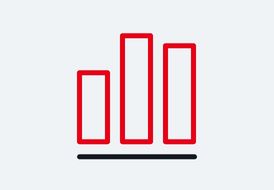Procurement and energy market
Depending on the market conditions, the purchase prices for raw materials, energy, and transport and construction services may fluctuate significantly. Since late 2022, we have observed a calming of raw material and transport prices after the very strong increases since 2020. On the other hand, very high and volatile energy prices are increasingly having a direct or indirect impact on producer prices and are impacting DB Group on many levels. Energy-oriented areas with a particular focus on materials in the infrastructure sector are particularly affected (due, among other things, to the energy-intensive production of steel, cement and concrete).
The war in Ukraine and, in particular, the sanctions imposed on Russia as a result and Russia’s reactions to them resulted in significant price increases, not only for gas and oil, but also for raw materials. Depending on future developments, these developments could become even more severe. This may result in further risks in terms of energy costs and construction prices.
Among other things, we counter the risk of further increases in energy prices through a stringent price adjustment strategy and the conclusion of long-term procurement contracts. However, these precautionary measures only have an effect for a limited time and must be weighed against potential opportunities arising from falling energy prices.
Depending on the market and competitive situation, it may not be possible or may only be possible to a very limited extent to pass increased costs on to the customer in the short term. This in turn has a negative impact on margins.
The consolidation of requirements and the optimization of long-term volume commitments result in opportunities to raise potential for procurement prices, even in a challenging market environment.


